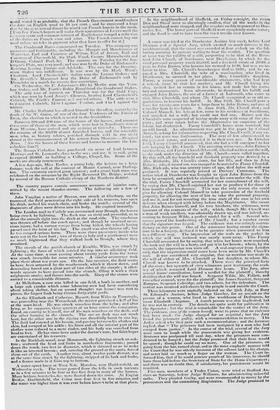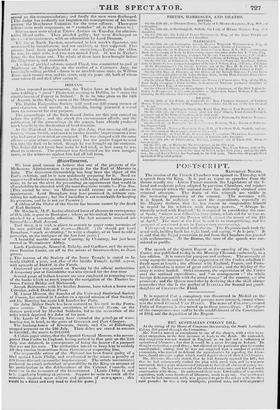A cause was tried at the Dorchester Assizes last week,
before Lord Denman and a Special Jury, which excited so much interest in the neighbourhood, that the street was crowded at four o'clock on the fol- lowing morning by persons waiting to hear the verdict. The question at issue was the validity of a will, purporting to be that of the Reve- reed Jelin Clavell, of Sinedmore, near Doschester, by which he de- vised personal property %with 20,00M and a freehold estate of 2000/, a year, to John Baines, who became his steward in 1830, but was no re- lation to Min. Mr. Clavell's housekeeper died in 1830; and lie en- gaged a Mrs. Churchill, the wife of a watchmaker, who lived in
hirchester, to succeed to her place. Mrs. Churchill's daughter, Fanny, a young person of considerable attainments, who had kept a school, came to visit her mother ; and Mr. Clavell liking her also, invited her to remain in his house, and made her his secre- tary and amanuensis. Soon afterwards, he dismissed his bailiff, and engaged John Baines, the son of a farmer at Lulworth, who came to visit Miss Churchill, and whom Clavell recognized as an old ac- quaintance, to become his bailiff. In Alay 18:33, Mr. (Atwell gave a lease for twenty-one years for a large farm to John Baines, and one of
a smaller farm to his father. In June 1833, 2iIr. Clavell died ; amid Colonel Mansell, his heir-at-law, came to his residence at Stnedniore, DIM searched for a will ; but could not find one. Baines and the Churchills were suspected of having made away with some of the pro- perty; and were taken before the Magistrates on suspicion of the
felony, but discharged. Fanny Churchill's boxes were searched, but no wilt found. An advertisement was putt in the paper by Colonel Mansell, asking for information respecting Mr. Clavell's will, if any ex- ieted ; but mete was forthcoming. The next of kin administered to the personal estate, and converted it to their own use. In October
1.z:33, Fanny Churchill annottneed, that she had a will consigned to her sofa. keeping by Mr. Clavell. The attesting witnesses—John Baines's two brothers, and Fanny Churchill herself, who had written out the will, as she said, under the direction of Mr. Clavell—were called together. By this will, all the leasehold and freehold property was devised to a Mrs. Richards, Mr. Clavell's sister, for her life, and then to John Baines ; who, it turned out, was engaged to &married to Fanny Churchill. Mrs. Richards, who was seventy years of age, died before the will was produced. It was regularly proved at Doctors' Commons. The action tried at Dorchester was brought to eject John Baines from the farm lie occupied, and which he claimed as his own under the will. On the trial, Fanny Churchill accounted for her concealment of the will, by saying that Mr. Clavell enjoined her not to produce it for three or four months after his decease. This was the only reason she could give for allowing Colonel Mansell to take possession of the freehold property, for allowing the next of kin to take the personal property, and use it, and for not revealing the true state of the case in her own defence when charged with felony before the Magistrates. She swore that John Baines himself, and his two brothers, the witnesses, were ignorant of the contents of the will ; which, though Mr. Clavell was a man of weak intellect, was admirably drawn up, and was indeed, ac- cording to Serjeant. Wilde, a perfect model for a will. Several wit- nesses proved the handwriting of Mr. Clavell ; but a number swore
that the signature was forged. The evidence was exceedingly contra- dictory on this point. One of the witnesses having sworn the signa- ture to be a forgery, declared it to be genuine when presented to him
in a different way. The impression of the seals on the packet in which the will was inclosed was nearly worn away. This Fanny Churchill accounted for by sityieg, that when her boxes were searched, she took out the will in a hurry, and put it in her bosom ; where, by the warmth, the impression was worn off. A seal-engraver from London said, that the impression could never have been made by Mr. (lumen's seal. It was considered very singular, that no mention was made in the will of either of Mrs. Churchill or her daughter, to whom Mr. Clavell was known to be attached. These were the principal facts of the ease ; but upwards of sixty witnesses gave testimony, the read- Mg of which occupied Lord Denman five hours. The Jury, after several hours' consultation, found a verdict for the plaintiff ; thereby deciding that the will was forged. Sergeant Wilde, Mr. Follett, and two other counsel, were for the plaintiff; Sir James Searlett, Sergeant Bompas, Sergeant Coleridge, and two others, for the defendant. The verdict was received with cheers by the people in and outside the Court.
Three labourers were capitally indicted on the 25th July, at Bury St. Edmund's Assizes, before Judge Gaselee, for an assault on the person of a woman, who lived in the workhouse of Dedington, by name Elizabeth 'Jhapmaii. A fourth person was also implicated, but
lie was not in custody. The details are quite unfit for publication in the Spectator; but the trial is remarkable for the verdict of the Jury. The evidence, even of the woman herself, went to prove that no violence had been used : the Judge charged for an acquittal ; but the Jury foetid the prisoners guilty, with a recommendation to mercy. The Judge asked why they gave such a recommendation ; and the foreman replied, that " The prisoners had been instigated by a man who had escaped from justice." In the course of the trial, several of the Jury were seen to laugh while the prosecutrix was giving her evidence. Sentence was postponed till next day, when the prisoners were con- demned to be hanged ; but the Judge promised that their lives would be spared ; though he could say no more, One of the prisoners, on going from tile bar, turned about, and in the most emphatic manner told the Court that he was utterly innocent of the offence laid to his charge, and never laid so much as a finger on the woman. The Court in- formed him, that if he could procure proofs of his innocence, he should have them laid before the Secretary of State for the Home Department ; and there was no doubt that, if satisfactory, his punishment would be remitted.
Five men, members of a Trades Union, were tried at Stafford As- sizes on Saturday, before Judge Williams, for administering unlawful oaths. They pleaded Guilty, and were recommended to mercy by the prosecutors and the committing Magistrates. The Judge promised to attend to the recommendation; and finally the men wore discharged. [The Judge has evidently not forgotten the consequences of his trails- porting the Dorchester Unionists for the same offence. Those poor fellows were made scapegoats, or " examples" of, as the phrase is.] Sixteen inen were tried at Exeter Assizes on 'Tuesday, for adminis- teriee illegal oaths. They pleaded guilty ; but were discharged on tht r n rceognizances, with an admonition by Lord Denman.
lit fire at North Tawton, mentioned in last week's Spectator, was occasioned by incendiarism, and not accident, as first supposed. Five persons have been apprehended on suspicion,—Taylor, the elder, bis sun, his son's wife, aid two men named Ford. It was in Taylor's house the fire broke out. The whole of these have been brought before the Magistrates, and remanded.
A eller of pickled salmon, named Flood, was committed to gaol at Maiqlszone on Wednesday, on the verdict of a Coroner's Jury, for knot, ;ugly selling pickled salmon in an unwholesome state, to William Bone, aged twenty-two, and his sister, only six years old, both of whom were taken ill and died after eating it.





















 Previous page
Previous page